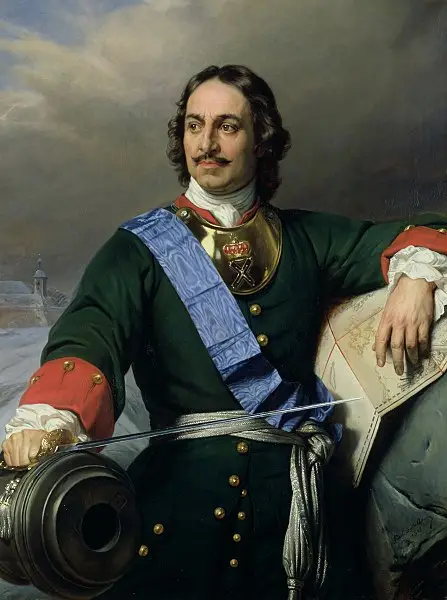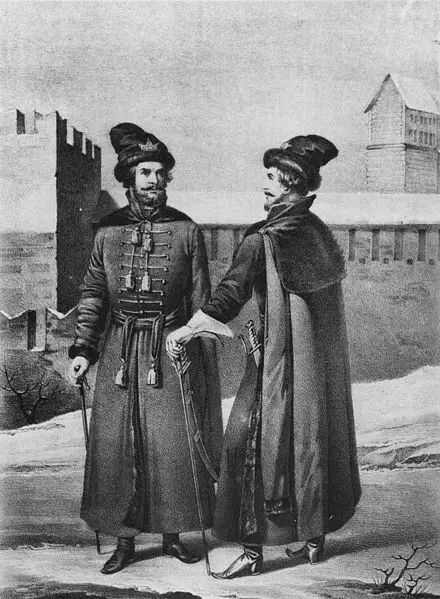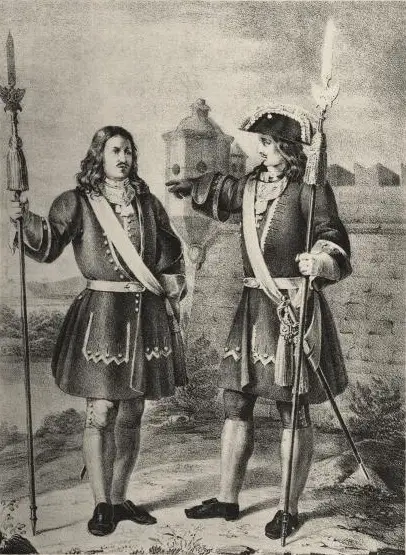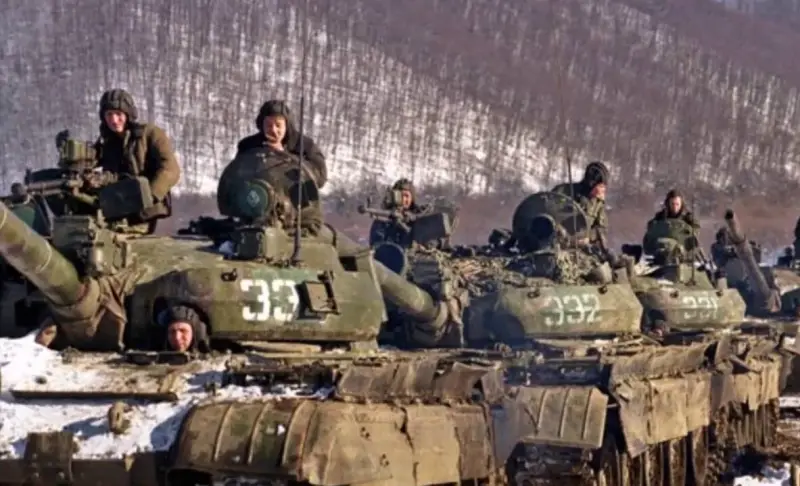Petrine system made the Russian army invincible

From the history
In Ancient Rus', the role of officers was performed by professional warriors-combatants. The best warriors who showed their military skills and luck usually became tens, pentecostals, centurions, and commanders of thousands. Later, such a system was preserved for a long time among the Cossacks, when the most experienced, best warriors and commanders became centurions, captains, and atamans.
In parallel, a local, parochial system was developing, when officers became officers by birth (representatives of the nobility, nobles, boyar children, boyars, princes). From the XIV–XV centuries. the local system became dominant. At the same time, service princes, boyar-voivodes, and landowners served from childhood, so they were trained professional warriors.
Large regimental and simple regimental governors were appointed from representatives of the Duma ranks (boyars, okolnichy, Duma nobles), and they were also sent as governors to border cities. The most honored boyars could be appointed commanders of the entire army. During wartime, some of the Moscow servicemen were part of the Sovereign's regiment, while others were sent to other regiments, where they, together with elected nobles, occupied the positions of governors, their comrades, and heads. When distributing positions, local seniority was taken into account.
In the 17th century, the Romanovs began to form regiments of a new system based on Western European models. There, the command staff was named in the Western manner (corporals, warrant officers, captains, captains, majors, etc.). The officers were foreign military specialists or their own nobles.

Initial people (heads) or officers of the Moscow Streletsky regiments: in 1674. Source: Historical description of clothing and weapons of Russian troops, ed. Viskovatova A.V., Part 1. - St. Petersburg. : Military typ., 1841-1862
Reform
On February 26 (March 9), 1714, the Russian sovereign Peter I issued a decree not to promote to officer ranks those nobles “who do not know the soldier's business from the foundation" The Guard became a forge of officer personnel for the Russian army.
In 1720, Peter I issued a decree that ordered chief officers who were not descended from nobles to issue patents for noble dignity and to consider their children and all their offspring as nobles.
Sovereign Pyotr Alekseevich solved two important problems at once. Firstly, the nobility retained its function as a military class, which had to devote a significant part of its life to military service. At the same time, Peter I solved the important task of instilling the fighting spirit of the officer corps. All future officers were required to begin their service as ordinary soldiers, this gave them combat experience and an understanding of military service. A blow was dealt to the idea that nobles should immediately occupy positions of authority simply by virtue of their birth.
Secondly, Peter I retained the possibility of renewing the nobility, the influx of “fresh blood”. The rank of nobility retained its high status, but achieving the rank of nobility through service was open. The tsar personally appointed as high commanders and dignitaries both nobles born into this rank and those who acquired it through service.
Thus, one can recall the talented cavalry commander, associate and tsar’s favorite, Field Marshal General, first Governor General of St. Petersburg, Alexander Danilovich Menshikov. The pie seller was successively Peter's orderly, bombardier, sergeant and lieutenant.
Peter can be treated differently. He was a versatile person. I messed up a lot and made mistakes. It is enough to recall the All-Joking, All-Drunken and Extraordinary Council that he created, and its abominations. Or admiration for foreigners, European culture, especially in the first period of government. When the court and army were filled with foreigners, a significant part of whom were represented by adventurers, careerists and various European rabble. Westernization of Russia and its elite, which ultimately became the root cause of the Russian civilizational and state catastrophe of 1917.
But his attitude towards military service inspires respect. Pyotr Alekseevich himself studied military art from a young age and began serving as a drummer in the Preobrazhensky Regiment, as a simple soldier. He thoroughly mastered the service of a bombardier (artilleryman). At the same time, Peter diligently studied maritime affairs and military construction.
Only after the capture of Azov did the tsar put on the uniform of an infantry officer (captain). And he became a non-commissioned officer of the guard in 1700. At the same time, the king did not disdain any work, he was both a carpenter and a blacksmith, and mastered several crafts well. In this way he set an example for the entire noble class. Having once met young noblemen who had returned from studying in Western Europe, the sovereign told them:
For the king, the main thing was not the origin of a person, but his personal qualities, skill, determination and courage. Ordinary soldiers were encouraged for good service, and could be promoted to officers for courage and skill. The Emperor placed military service very highly.
“Military Regulations” asks the question: “What is a soldier?" And he answers it as follows:
The regimental courts were to include not only headquarters, chief and non-commissioned officers, but also soldiers. Both officers and soldiers had the right to a free and decisive vote.
Peter forbade officers to take privates into service, except for orderlies. However, orderlies could also be hired in limited numbers, and they were not considered forced servants. They could not be treated harshly. The orderly under the officers performed a variety of functions - he was a messenger, messenger, security guard, took care of the officer’s life, luggage, etc. Usually orderlies were taken from the less capable lower ranks.

Chief officer and Staff Officer of the Preobrazhensky Regiment, from 1700 to 1732. Source: Historical description of clothing and weapons of Russian troops, ed. Viskovatova A.V., Part 2. - St. Petersburg. : Military typ., 1841-1862.
Petrovskaya system
Peter's system, aimed at forming a class of warriors familiar with military service from a young age and knowing all the intricacies of military affairs, led to brilliant results. Already under Pyotr Alekseevich, the Russian army surpassed in the art of war one of the most advanced armies in Western Europe - the Swedish. The Russian armed forces surpassed the Swedish ones in all areas: they defeated them in a number of battles, including in the general battle - the Battle of Poltava, took their most important fortresses in the Baltic states, and learned to fight at sea. The Russian Baltic Fleet, created by Peter, surpassed the Swedish fleet. Subsequently, the army created by Peter brilliantly smashed the Persians, Crimean-Turkish hordes, Swedes, Prussians and French.
During the Seven Years' War, the Russian army stopped the formidable Prussian troops of Frederick the Great, who were considered the best in Western Europe, at the Battle of Zorndorf. The Russian infantry showed amazing resilience in this battle. A participant in this battle, A. T. Bolotov, described one of the stages of this battle as follows:
And the Prussian king Frederick, summing up the results of the battle, said that Russian soldiers
The Prussians simply refused to go on the attack, having tasted Russian bayonets. At the Battle of Kunersdorf, the Russians completely crushed the Prussian army, the best in Europe. Then Russian troops took Berlin and Königsberg, the most important centers of Prussia.
Russian troops under the command of Rumyantsev and Suvorov simply swept the Crimean-Turkish hordes out of their way. They were beaten in small numbers. Brilliant victories at Larga and Kagul, the assaults of Ochakov, Izmail and Anapa forever entered the Russian military chronicle. The Russian fleet under the command of Ushakov made the Black Sea a “Russian lake”. Suvorov’s Italian and Swiss campaigns showed Europe that Russian soldiers were capable of defeating the new “star” of the European arena - the French army.
In the future, the Russian army will be able to firmly meet the blow of Napoleon’s “Grand Army” - in fact, it will be a “pan-European army”, commanded by a cohort of the best French and European commanders. However, almost this entire army will be buried in the vastness of Russia. Russian soldiers will stand indestructibly in the Battle of Borodino, drive away the European hordes and liberate Berlin, and then Paris. Russian soldiers will annex the North and South Caucasus to Russia, defeating the Ottomans, Persians and highlanders.
Tsar Peter destroyed the remnants of localism. This was the name for the order of distribution of official places, taking into account the origin and official position of the ancestors of the nobleman (boyar). Ivan the Terrible also struggled with this problem. A nobleman under Pyotr Alekseevich, if he did not serve the sovereign - 7 years in military service or 10 years in civilian service, until old age was considered a “minor,” that is, a nobleman who did not enter public service.
Those nobles who avoided military reviews were deprived of their estates. As a result, the original essence of the existence of the nobility was restored. The nobles had to defend the Fatherland, shed blood, and devote their best years to service. For this they received the right to the estate. Under Peter, the service of a hereditary nobleman could continue until old age as privates and non-commissioned officers. This was especially true for illiterate nobles and landless nobles, single-lords.
For a long historical era it was a fair system. Rus'-Russia has been at war throughout its history. There were almost no peaceful years. The entire population, classes and social groups performed “service”. The raison d'être of the nobles was to protect the Fatherland. They were soldiers of Russia, and the Tsar was their general, the supreme commander in chief.
If a nobleman stopped serving for any reason, the estate was confiscated. The widow of a deceased warrior had the right to a part of the estate sufficient to feed her (this part was called “oprich” - “except”). If the children of a deceased nobleman did not join the fighting line by the age of 15, the estate was taken away for the benefit of the state. True, this did not stop everyone. Those who did not want to serve could enroll in other classes - the clergy, merchants or even peasants. There were even cases of nobles becoming slaves. Thus, in pre-Petrine times, decrees were issued prohibiting nobles from becoming slaves.
Destruction
Unfortunately, under other rulers this system began to collapse. After the death of Pyotr Alekseevich, the nobles began to receive one privilege after another. In 1736, Anna Ioannovna limited their service to 25 years. In 1746, Elizabeth prohibited all classes, except the nobles, from buying land and peasants.
Peter III generally exempted nobles from compulsory service - “Manifesto on the Freedom of the Nobility” of February 18, 1762. Catherine II will confirm this manifesto and further expand the rights of the nobility. At the same time, the noble class fully retained its previous privileges and constantly increased their number.
The nobility turned into a closed privileged caste. They could even leave Russia and live most of their lives in Western Europe. Moreover, they received the right to enter foreign service. From now on, for a significant part of the Russian “elite”, France, England, Italy and Germany will become much more interesting and nicer than “this” Russia. They will squander huge amounts of money in European cities, which will be siphoned out of the peasantry and Russia. In fact, part of the nobility will become outright parasites. And the further it goes, the more frank it will be.
During the same period, serfdom received its classic form. Nobles received the right to freely dispose of their lands, regardless of whether they served. The nobles received the right to transfer peasants from one district to another, and bureaucratic obstacles were strengthened that prevented the peasants from joining the ranks of merchants.
Under the dominance of Western culture, when German became the native language of the nobles, then French and English, a huge gap arose between the nobles and the peasantry. In the Russian Empire they created a “foreign people”, a foreign body on the Russian people. The people's powerful reaction to this injustice was Pugachev's Peasant War (Russian riot). Subsequently, the contradiction was not resolved and served as one of the most important prerequisites for the Russian Troubles of 1917.
It should be noted that, spat upon by everyone and turned into a fool, Emperor Pavel (The myth of the "mad emperor" Paul I) understood this problem well. This was a sovereign knight who tried to restore justice, return to the correct system, discipline the nobility, and make the existence of the peasantry easier. However, his attempt to bring back the ideals of chivalry, restoring the true raison d'être of the nobility, and his challenge to Britain led to a conspiracy. Traitor nobles, with the organizational support of the British, killed the Russian Tsar. And then they denigrated his name, creating the image of a jester and despot on the throne.
The destruction of the system that Peter introduced gradually led to a weakening of Russia's military power, especially with regard to the generals. Careerists, performers, sons of aristocrats and generals began to become generals. “Militancy”—decisiveness and initiative—began to leave the army. There were many “peacetime” generals who served well in peacetime, but could not lead troops to victory during the war. The result was disastrous - defeat in the Eastern War, numerous mistakes and unnecessary casualties in the 1877-1878 campaign, defeat by Japan, the disaster of the First World War and the Troubles of 1917.
This same vicious practice was inherited by the Red and Soviet armies. Hence the disasters of 1941-1942. Then the fighting Russian army, which took Warsaw, Königsberg, Vienna, Berlin and Prague, was revived. Many fools were removed, others died, and “new blood” arrived. Khrushchev and Gorbachev with their “reforms” practically destroyed the army and its spirit. All that's left is the form. The Russian Army took the worst that was in the army of the Russian Empire and the USSR. Careerism, lack of initiative, belligerence, window dressing, unwillingness to learn from mistakes. Therefore, SVO in 2022-2024. does not shine with victories. But there are a lot of mistakes by the command, which ordinary soldiers cover up with their heroism.
It should be noted that during the Eastern (Crimean) War, the Russian-Turkish War of 1877-1878. and the First World War, Russian troops fought best on the Caucasian front. In the Caucasus, Russian troops were in constant readiness; war with the Turks, highlanders or Persians could break out at any moment. There was no place for servicemen and careerists; real military officers served in the Caucasus.
Ideally, this system needs to be restored in Russia. Anyone who aspires to be an officer must begin his career as a private in the army. Show your skills and knowledge, the ability to be a soldier, grow to a non-commissioned officer (sergeant major, sergeant, warrant officer), and then grow to train for an officer position.
This is exactly how they served in the Third Reich, which was distinguished by an excellent officer and senior command corps. Future colonels, generals and field marshals of the Wehrmacht began their service as privates. Having shown their willingness to learn, their skills, they took a number of courses and schools, becoming experienced commanders of the Reichsheer (ground forces of the German Empire), Reichswehr and Wehrmacht.

T-62M of the 160th Guards Regiment on the march. Chechen War
Information